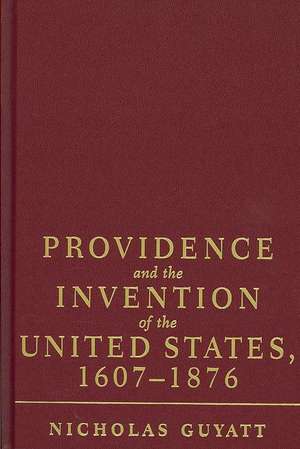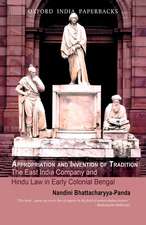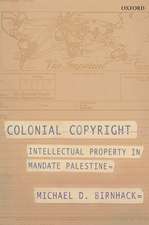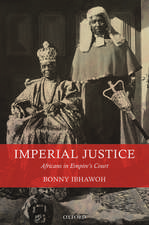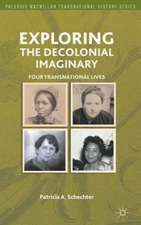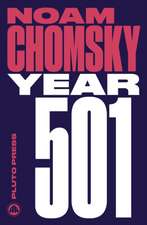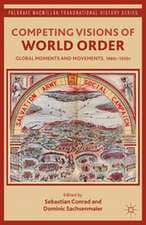Providence and the Invention of the United States, 1607–1876
Autor Nicholas Guyatten Limba Engleză Hardback – 22 iul 2007
| Toate formatele și edițiile | Preț | Express |
|---|---|---|
| Paperback (1) | 240.63 lei 6-8 săpt. | |
| Cambridge University Press – 22 iul 2007 | 240.63 lei 6-8 săpt. | |
| Hardback (1) | 546.90 lei 6-8 săpt. | |
| Cambridge University Press – 22 iul 2007 | 546.90 lei 6-8 săpt. |
Preț: 546.90 lei
Preț vechi: 614.50 lei
-11% Nou
Puncte Express: 820
Preț estimativ în valută:
104.66€ • 109.13$ • 86.98£
104.66€ • 109.13$ • 86.98£
Carte tipărită la comandă
Livrare economică 20 martie-03 aprilie
Preluare comenzi: 021 569.72.76
Specificații
ISBN-13: 9780521867887
ISBN-10: 0521867886
Pagini: 352
Dimensiuni: 160 x 240 x 24 mm
Greutate: 0.61 kg
Editura: Cambridge University Press
Colecția Cambridge University Press
Locul publicării:New York, United States
ISBN-10: 0521867886
Pagini: 352
Dimensiuni: 160 x 240 x 24 mm
Greutate: 0.61 kg
Editura: Cambridge University Press
Colecția Cambridge University Press
Locul publicării:New York, United States
Cuprins
Part I. Britain, America, and the Emergence of Providential Separatism: 1. Providence and the problem of England in early America; 2. 'Empires are mortal': the origins of providential separatism, 1756–1775; 3. 'Becoming a nation at once': providentialism and the American Revolution; Part II. Providence, Race, and the Limits of Revolution: 4. 'One glorious example': the limits of Revolutionary providentialism; 5. 'Deifying prejudice': race and removal in the early republic; 6. 'Divided destinies': the providential meanings of American slavery; 7. 'The regenerated nation': the Civil War and the price of reunion; 8. William Lloyd Garrison's complaint.
Recenzii
"In a work of admirable scope and learning, Nicolas Guyatt explores the transatlantic roots and multiple expressions of Americans’ understanding of God’s role in national life. He convincingly shows that providential ideas not only validated political goals but helped shape them, closing off some paths of development just as they opened others. Providence and the Invention of the United States is a superb contribution to our understanding of how American contested their national destiny from before the Revolution to the era of the Civil War."
-Richard Carwardine, St. Catherine’s College, University of Oxford
"Historians have long noticed that providential thinking played an important role in forging an American identity. Nicholas Guyatt does not dispute this notion but he complicates it. He shows that the idea of national providence, rooted in England but appropriated by American colonials after passage of the Stamp Act, became both a national consensus and a metaphor that served different political and sectional interests. Guyatt’s book is intellectual history at its best."
-R. Laurence Moore, Cornell University
"Nicholas Guyatt's study of providential reasoning is both well researched and capably argued. It goes much further than other scholars, including myself, have done to show how important the idea of providence was for almost everyone in the English-speaking world during the early modern period. But it also demonstrates convincingly that providence meant different things to different people at different times. This is a very good book."
-Mark Noll, University of Notre Dame
"With learning and concision, Nicholas Guyatt has elegantly historicized the amorphous traditions of American providentialism, that regrettably powerful habit of cultural hyperbole, by which Americans have located themselves in God's order. He is especially cogent in showing with what passionate disagreement Americans have imagined that order, which turns out to have been rather disorderly."
-Michael O'Brien, University of Cambridge
"[A] valuable insight into the nature of American politics that resonates not only for the period studied but into the twenty-first century. [...] Guyatt convincingly argues that providential understandings played a large role in shaping Americans' conceptions of law, national mission, race, and themselves. [...] It is a joy to read superbly crafted prose, and Guyatt's skill as a writer may even exceed his considerable skill as a historian. The book's readability promises that it may well reach the large audience interested in its subject matter."
-Mark D. McGarvie, University of Richmond, The Journal of American History
"Guyatt has presented us with a well-researched and cogently argued work...this book should be consulted by any historian interested in politics and social issues in the United States up to Reconstruction." --Canadian Journal of History
"[An] ambitious and important book" "[G]oes far beyond previous studies of this subject." "[A] lucid and engaging analysis." "[S]hould become an indispensable resource for scholars and students of political and religious history." Richard Godbeer, American Historical Review
"Guyatt presents a rich, complex argument about the uses of national providential ideas in early America...This work should receive serious attention from scholars of the early republic" --Journal of the Early Republic
-Richard Carwardine, St. Catherine’s College, University of Oxford
"Historians have long noticed that providential thinking played an important role in forging an American identity. Nicholas Guyatt does not dispute this notion but he complicates it. He shows that the idea of national providence, rooted in England but appropriated by American colonials after passage of the Stamp Act, became both a national consensus and a metaphor that served different political and sectional interests. Guyatt’s book is intellectual history at its best."
-R. Laurence Moore, Cornell University
"Nicholas Guyatt's study of providential reasoning is both well researched and capably argued. It goes much further than other scholars, including myself, have done to show how important the idea of providence was for almost everyone in the English-speaking world during the early modern period. But it also demonstrates convincingly that providence meant different things to different people at different times. This is a very good book."
-Mark Noll, University of Notre Dame
"With learning and concision, Nicholas Guyatt has elegantly historicized the amorphous traditions of American providentialism, that regrettably powerful habit of cultural hyperbole, by which Americans have located themselves in God's order. He is especially cogent in showing with what passionate disagreement Americans have imagined that order, which turns out to have been rather disorderly."
-Michael O'Brien, University of Cambridge
"[A] valuable insight into the nature of American politics that resonates not only for the period studied but into the twenty-first century. [...] Guyatt convincingly argues that providential understandings played a large role in shaping Americans' conceptions of law, national mission, race, and themselves. [...] It is a joy to read superbly crafted prose, and Guyatt's skill as a writer may even exceed his considerable skill as a historian. The book's readability promises that it may well reach the large audience interested in its subject matter."
-Mark D. McGarvie, University of Richmond, The Journal of American History
"Guyatt has presented us with a well-researched and cogently argued work...this book should be consulted by any historian interested in politics and social issues in the United States up to Reconstruction." --Canadian Journal of History
"[An] ambitious and important book" "[G]oes far beyond previous studies of this subject." "[A] lucid and engaging analysis." "[S]hould become an indispensable resource for scholars and students of political and religious history." Richard Godbeer, American Historical Review
"Guyatt presents a rich, complex argument about the uses of national providential ideas in early America...This work should receive serious attention from scholars of the early republic" --Journal of the Early Republic
Notă biografică
Descriere
The development, and costs, of the idea that God has a special plan for America.
